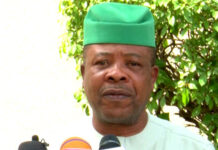Leaders and experts from the world’s scientific, business, government and civic communities convened in Stockholm, Sweden, to exchange views, experiences and shape joint solutions to global water challenges. NNANNA OKERE, who was at the annual conference, reports…
From the beginning of creation, water has always been regarded as one of the most basic needs in life, not just for man, but also for other living organisms. ‘Water is life’ finds relevance in the fact that it is unarguably one of the essential elements of existence.
Today, however, the scarcity of water is becoming more of a global threat to life. Although, ironically, scientists said about 70 per cent of the earth is covered with water, its scarcity has been attributed to various activities of man which has polluted the oceans, seas and other sources of water supply.
However, Stockholm, the capital city of Sweden, was agog from August 31 to September 5, 2014 as world leaders gathered for the 24th annual World Water Week, urging the energy and water communities to work together to face some of the main challenges of our time, providing clean drinking water and energy for a growing world population.
It was a speech-making conference as in the over 100 seminars, workshops and events spread throughout the week, delegates discussed water-related issues, future work and collaboration between the energy and water communities. In the conference that attracted over 3,000 participants from more than 140 countries, water efficiency and ways to achieve it was highlighted in several sessions.
Welcoming the delegates to the conference titled ‘Energy and Water’, Executive Director of Stockholm International Water Institute – organisers of the conference, Torgny Holmgren, noted that the challenges are immense as energy and water communities must cooperate to meet global challenges.
“Water and energy are inter-dependent in more ways than not. We need energy for pumping, storing, transporting and treating water; (and) we need water for producing almost all sorts of energy. An increase or decrease in one will immediately affect the other. The two resources are also inseparable from sustainable development and must be tirelessly promoted in global decision-making.
“With the global demand for water projected to grow by 55 per cent between 2000 and 2050, and electricity demand expected to increase by 50 per cent in the next two decades, there is an urgent need for a closer relationship between the energy and water communities, if we are to provide solutions for all peoples to prosper,” he said.
Professor John Briscoe, 2014 Laureate of Stockholm Water Prize, spoke about water as a platform for growth of other sectors and society as a whole.
His words: “Developing countries face big challenges. They have yet to mobilise those resources. There is no eternal solution to the water crisis neither here nor there. Instead, there is a cycle of challenges and responses.”
United Nations Under-Secretary-General and Special Representative of the Secretary-General for Sustainable Energy for All, Kandeh Yumkella, noted that one of the major challenges that our world faces today was providing modern energy services and water for billions without both.
“As global demand for both energy and water increases, we must think about the way we produce and use both to ensure shared prosperity for all citizens, protect the environment, achieve socio-economic development and secure peace and stability,” he said.
Mr. Neil Macleod of eThekwini Water and Sanitation in South Africa, stressed on the necessity to invent a toilet that does not need water. According to him, the flushing toilet belongs in the history books, in the museums, adding that a non-flush toilet would cut a household’s water use by 30 per cent and allow us to extract both fuel and fertiliser that today literally is flushed down the drain.
The head of the International Energy Agency (IEA), Ms. Maria van der Hoeven, spoke on the need to grow biofuels in areas that rely on rain rather than irrigation, something that would also lessen dependency on power to draw water.
“The water-energy nexus is firmly on the agenda of IEA. And so is development. We know that 1.2 billion people in the world lack electricity, mainly in sub-Saharan Africa. We therefore applaud next year’s World Water Week theme, ‘Water and Development’.” she stated.
However, concerned scientists have disclosed that hunger will never be eradicated without better rainwater management. In their presentation at the conference, Professor Malin Falkenmark of Stockholm International Water Institute/Stockholm Resilience Centre and Professor Johan Rockstrom of Stockholm Resilience Centre are deeply concerned that sustainable management of rainfall in water-scarce regions of the world was missing in the goals and targets proposed by the UN Open Working Group on Sustainable Development Goals (SDGs) on Poverty, Hunger and Freshwater.
“Attempting to eradicate global poverty and hunger without addressing the productivity of rain is a serious and unacceptable omission, and the SDGs as currently proposed cannot be achieved without a strong focus on sustainable and resilient management of rainfall for resilient food production,” the scientists say.
Highlight of the conference was the presentation of several prizes and awards for excellence in water-related issues. The Stockholm Industry Water Award was awarded to eThekwini Water and Sanitation, serving the Durban metropolitan area, for its transformative and inclusive approach to providing water and sanitation.
Hayley Todesco from Canada received the 2014 Stockholm Junior Water Prize for inventing a method that uses sand filters to treat contaminated water and recover water for reuse. And the prestigious Stockholm Water Prize was awarded to Professor John Briscoe of South Africa, for his unparalleled contributions to global and local water management, inspired by an unwavering commitment to improving the lives of people on the ground. His Majesty, King Carl XVI Gustaf of Sweden, presented the prize to Prof. Briscoe at a Royal Award Ceremony during the World Water Week in Stockholm.
Seven journalists win prestigious media awards for excellence in reporting on critical water, sanitation and hygiene-related (WASH) issues.
The conference closed with participants jointly emphasising the importance of a water goal, as well as intimate integration of energy and water in the Post-2015 Development Agenda. The Week added that water efficiency was one of the main tools in combatting poverty and hunger.














